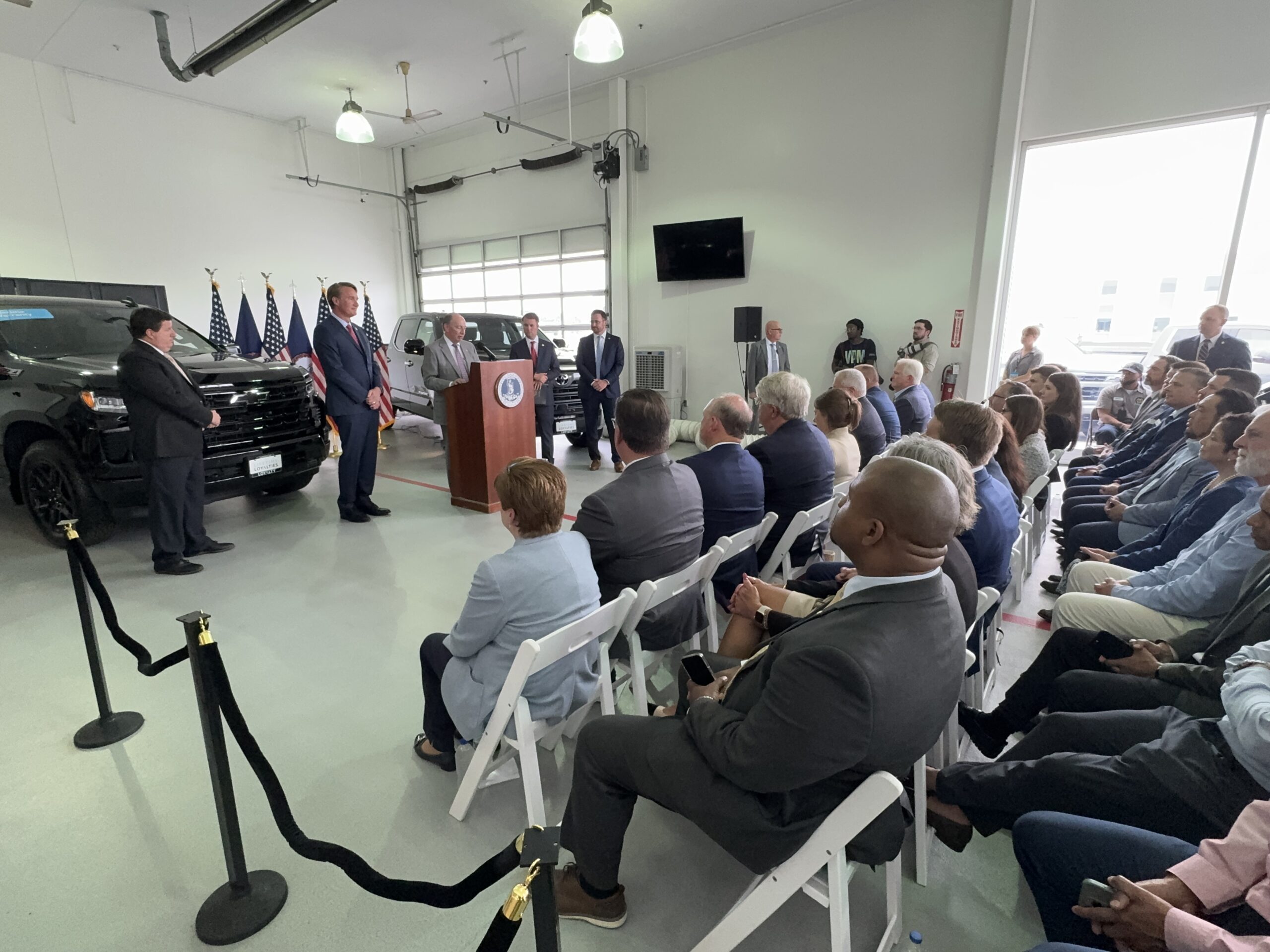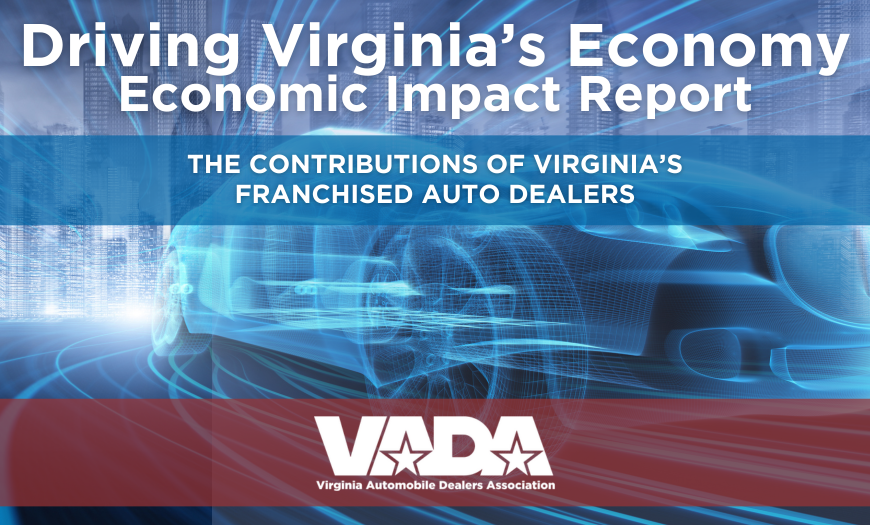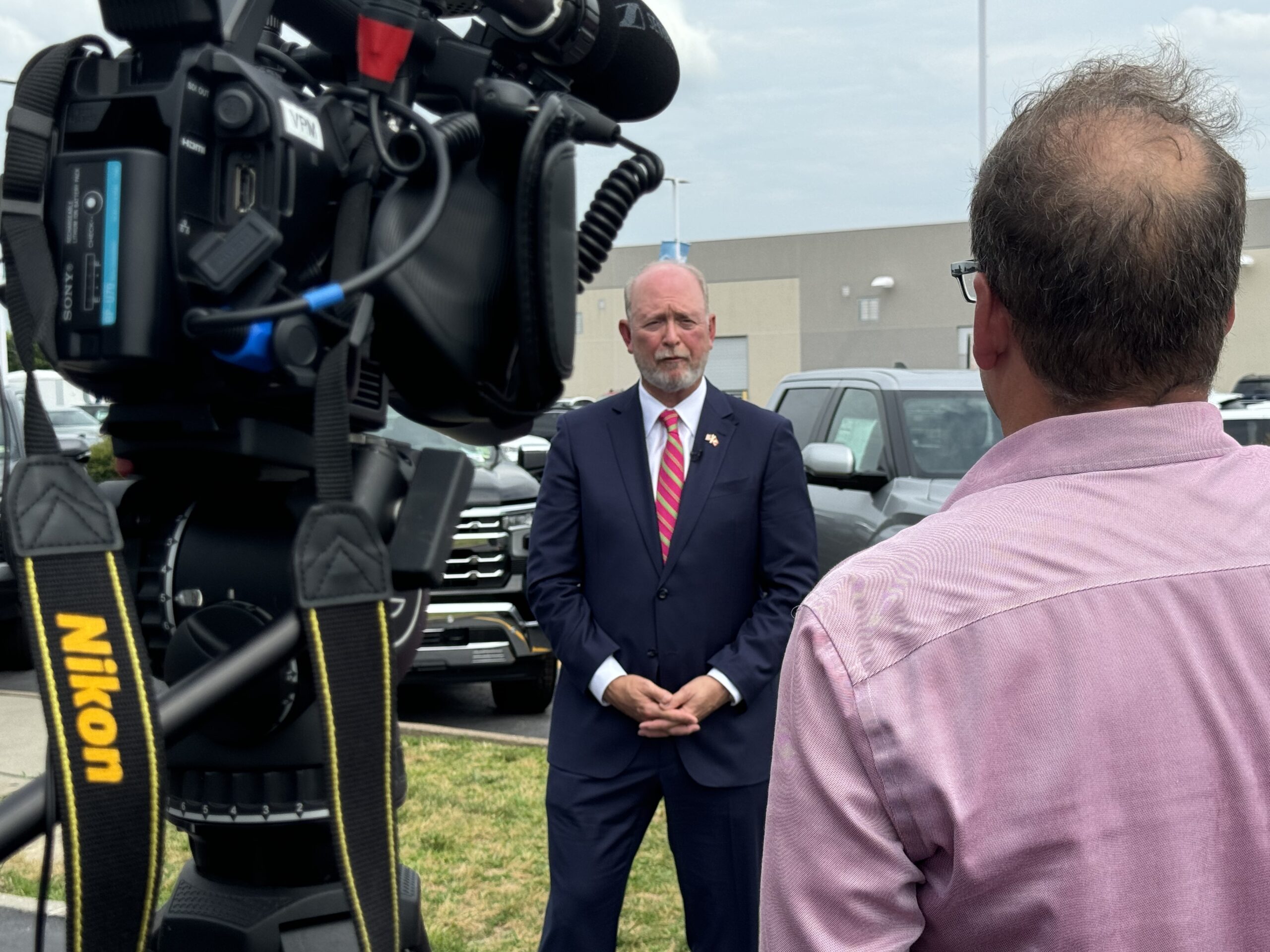June 5, 2024
Note: Today, Governor Youngkin today announced the end of the California electric vehicle mandate in Virginia, effective at the end of 2024 when California’s current regulations expire. An official opinion from Attorney General Jason Miyares in response to a request by the Governor and Senate Republican Leader Ryan McDougle confirms that Virginia is not required to comply with expansive new mandates adopted by the unelected California Air Resources Board (CARB) set to take effect January 1, 2025. Here is the full release and link to the official memo from the Attorney General's office.

Loyalty Toyota's Dave Perno introduces Governor Glenn Youngkin and Attorney General Jason Miyares at the June 5 announcement that Virginia will exit California's zero-emission vehicle requirements at the end of the year.
Here is our statement, attributed to VADA President and CEO Don Hall:
 Our support for the California Air Resources Board standards was done to drive demand for fully electric vehicles in Virginia and support dealer interests, as doing so put the Commonwealth in a stronger position for manufacturers to send EVs to our dealers and consumers.
Our support for the California Air Resources Board standards was done to drive demand for fully electric vehicles in Virginia and support dealer interests, as doing so put the Commonwealth in a stronger position for manufacturers to send EVs to our dealers and consumers.
The reality, however, is that consumer demand for EVs in Virginia and nationally has not yet materialized, compounded by costs, “range anxiety,” and the lack of charging and electrical infrastructure to support these new vehicles. We continue to believe EV goals are achievable, but on a longer timeline.
We respectfully have come to the point where we believe Virginia should uncouple itself from these standards at this time. The lack of bipartisan support and funding for the standards means an unfunded mandate is weighing down Virginia with goals that are impossible to attain in the 2035 timeframe, as currently required.
Virginia and many other states continue to be held under federal emissions standards, which do not necessarily require all vehicles be zero-emissions, opening the door for more hybrid vehicles in addition to a mix of EVs and internal-combustion engine (ICE) vehicles.
Despite government-driven goals, it is important to recognize that Virginians, and all Americans, will always have a choice in the type of vehicles they buy. Virginia dealers continue to be “all in” to sell and service not only EVs, but also hybrid and ICE cars and trucks. Virginia dealers will continue to make investments to prepare for the electrification of the transportation industry.
We appreciate the attorney general’s focus on protecting consumers and Virginia businesses. Without full support from the legislature and Virginia’s administration, an unfunded mandate only hurts our dealers — and the drivers and families they serve.
Moving forward, it is critical to find a balanced approach that considers industry realities, consumer needs, and policies that help, not hinder, progress. We remain committed to discussions at the state and national level to ensure automobile dealers can continue to meet the needs of their customers and communities.
Background on CARB in Virginia
In 2021, Virginia lawmakers with VADA’s support adopted California’s CARB zero-emissions vehicle (ZEV) mandates. The move was meant to help pave the way for more fully electric vehicles in Virginia. Under CARB, Virginia regulations require 100% of all new vehicles in Virginia to be fully electric by 2035.
Why? Because states that adopted and implemented the ZEV standards were put in a stronger position to receive EVs consumers want to buy, as manufacturers receive federal tax credits for EV sales. Furthermore, most auto manufacturers made it clear they are committed to phasing out gas-powered engines over the next two decades. Virginia was the 15th state to adopt the California standards, and today is one of 18 states and the District of Columbia to have them.
Unfortunately, the lack of consumer adoption and state funding for CARB meant the policy hurts, not helps, consumers and auto dealers.
In 2022, the Virginia Office of the Attorney General ruled that the Commonwealth is “bound” by the California decision to go fully electric because the Commonwealth's leaders chose to be “statutorily and regulatorily aligned with California.” To change may require an amendment or repeal of the legislation, the office said.
The General Assembly directed Virginia’s Department of Environmental Quality to adopt the California Clean Cars I program and amendments to it. The Governor's office says Virginia law does not compel the adoption of the second—and more expansive—iteration of California’s standards, Advanced Clean Cars II (ACC II). This is an entirely new regulation, not simply an amendment to the existing ZEV standards. As such, the Attorney General has concluded the 2021 Virginia legislation does not require the Commonwealth to adopt the new regulation.
Note: At the official announcement by Gov. Youngkin on June 5, dealer Tim Pohanka delivered remarks and insight on EVs from the dealer perspective. Read his comments here.
Q&A
The Market for EVs in Virginia
 According to a 2023 Economic Impact Report from VADA:
According to a 2023 Economic Impact Report from VADA:
- EVs account for 8.8% of all new vehicles sold in Virginia, up from 3.1% in 2021. Hybrid vehicles (which use gas, but recharge a battery for greater mileage) accounted for 11% of sales. However, hybrid does not contribute to CARB targets.
- The average Virginia dealership invests $348,000 to upgrade their infrastructure to support EVs.
- Virginia dealers are expected to spend $159 million in 2024 upgrading their facilities to sell and service EVs.
- Dozens of new fully electric models will be released over the next few years from well-known manufacturers.
How is VADA reacting to this announcement by the attorney general?
Our organization proudly represents and informs dealers across the Commonwealth, many of whom share concerns surrounding the adoption and implementation of fully electric vehicles.
With that mission is a responsibility to listen to consumers and dealers. What they are experiencing is a gap between legislative commitment and practical implementation, with no allocated budget for incentives or sufficient infrastructure to support achievement of the specified standards.
Despite this, VADA emphasizes the inevitability of the EV revolution and Virginia's role as a leader in fostering adoption of these exciting new vehicles.
VADA advocates for comprehensive policies, including infrastructure and incentives, to support the transition to electric transportation.
What does this recent announcement mean for consumers?
We urge consumers to continue to follow the developments out of Virginia and Washington to become informed buyers and sellers who are – in many ways – in the driver’s seat. We want all Virginians, and all Americans, to always have a choice in the type of vehicles they buy and sell.
Where do federal emissions standards factor in?
Possible reversal of CARB doesn’t mean Virginia is free of regulation or emissions standards.
States can choose to follow the California standards or the corresponding federal standards under the Environmental Protection Agency’s Clean Air Act. If CARB does not apply to Virginia, the EPA’s Clean Air Act and its parameters for vehicle emissions still does. Unlike California standards, federal regulations only pertain to emissions standards, not a particular type of drivetrain.
- The EPA mandate requires 67.5% of U.S. car sales be fully electric by 2032, leaving a significant amount of opportunity for new hybrid and internal-combustion vehicle sales.
What does this mean for the future of electric vehicles in Virginia?
We continue to believe in an EV future, as evidenced by manufacturers investing heavily into developing these new vehicles. But regulation and policy must match the reality.
Under CARB or federal standards, Virginians, and all Americans, will always have a choice in the type of vehicles they buy. Virginia dealers continue to be “all in” to sell and service not only EVs, but also hybrid and ICE vehicles. Virginia dealers will continue to make investments to prepare for the electrification of the transportation industry.
Is VADA simply aligning itself with each administration's changing policies?
VADA is a nonpartisan organization. We align and support policies that meet the needs of consumers and dealers and what we believe is best for Virginia at any given time.
You have publicly supported CARB and Virginia’s adoption. Why are you changing your stance now?
Our position in support of the ZEV mandates was not the traditional posture of dealer associations. We believe we charted the right course for Virginia dealers. We would not have been in the position to affect the EV issue more broadly had we taken a different position on this issue.
EV adoption will be achieved only with the investment of all parties: manufacturers, dealers, electric utilities, environmental groups, government, and consumers.
Pricing and Demand of EVs
According to Kelley Blue Book, the cost of EVs has gotten closer to traditional vehicles, but only because the cost of traditional vehicles has risen:
- January 2024: Average price of EV is 17% higher than ICE ($55,353 vs. $47,401)
- January 2020: Average price of EV is 34% higher than ICE ($54,669 vs. $38,747)
A Boston Consulting Group study found U.S. consumer acceptance of EVs hinges on four factors:
- 20-minute charging times
- 30-minute maximum to find and wait for access to a fast-charging station
- 350 miles or more of driving range per charge
- Price of $50,000 or less, along with more vehicle variety

